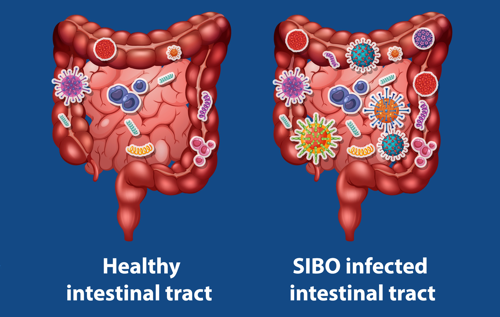Small Intestinal Bacterial Overgrowth (SIBO): Your Complete Diet Guide
Living with small intestinal bacterial overgrowth (SIBO) can feel overwhelming, especially when trying to navigate the complex world of nutrition and symptom management. While the bacteria in your digestive tract play a crucial role in health, an overgrowth in the small intestine can lead to significant discomfort and nutritional challenges.

Understanding Small Intestinal Bacterial Overgrowth and Your Digestive Health
The small intestine normally maintains a delicate bacterial balance, but when this equilibrium is disrupted, bacterial overgrowth occurs. This condition affects the small bowel's ability to properly digest and absorb nutrients, leading to various complications.
Unlike the large intestine, which naturally houses large numbers of bacteria, the small intestine should maintain relatively low bacterial levels. When bacteria from other parts of the digestive tract migrate or multiply excessively in the small bowel, SIBO develops.

SIBO Symptoms and Their Impact on Daily Life
People with SIBO often experience a range of challenging symptoms:
- Persistent bloating, especially after meals
- Abdominal pain and discomfort
- Unpredictable bowel movements, including diarrhea
- Unexpected weight changes
- Fatigue and nutrient deficiencies
- Food sensitivities and intolerances
The Critical Role of Diet in Managing SIBO Bacteria
Diet plays a fundamental role in managing bacterial growth in your small intestine. The foods you choose can either:
- Feed problematic bacteria, worsening symptoms
- Help maintain bacterial balance
- Support proper nutrient absorption
- Aid in overall digestive health
Understanding this relationship becomes crucial for long-term management. While each person's experience with SIBO may vary, certain dietary principles remain consistent across cases.

SIBO Diet Approaches: Finding Your Path to Relief
The Low FODMAP Diet and SIBO
This elimination diet focuses on reducing fermentable carbohydrates that can feed excess bacteria. While potentially beneficial, it requires careful implementation and guidance for success.
Elemental Diet Considerations
An elemental diet provides nutrients in pre-digested form, potentially helping to starve excess bacteria. This restrictive approach should only be undertaken with professional supervision.
The Specific Carbohydrate Diet for SIBO
This approach limits certain carbohydrates that may contribute to bacterial overgrowth while allowing others that are more easily digested.
How Carbohydrates Affect Your SIBO Symptoms
Carbohydrate intake significantly influences bacterial growth and symptoms. Different types can:
- Provide fuel for harmful bacteria
- Impact intestinal motility
- Affect nutrient absorption
- Influence gas production
- Trigger digestive discomfort
Understanding which carbohydrates to limit becomes essential for effective management.

Testing and Diagnosis: Understanding Your SIBO Type
Healthcare providers often use specialized tests to diagnose SIBO:
- Hydrogen breath testing
- Methane breath test
- Small intestine aspirate and fluid culture
- Comprehensive digestive stool analysis
These tests help determine:
- The presence of bacterial overgrowth
- The type of gas being produced
- The severity of the condition
- Potential treatment approaches
Creating Your Comprehensive SIBO Treatment Strategy
Effective SIBO management typically involves multiple approaches:
Medical Interventions
- Antibiotic therapy when prescribed
- Prokinetic agents for motility
- Treatment of underlying conditions
Dietary Management
- Structured meal planning
- Food combination strategies
- Timing considerations
- Portion control
Beyond Diet: Supporting Your SIBO Recovery
While diet remains crucial, complete SIBO management includes:
- Stress reduction techniques
- Proper meal spacing
- Regular physical activity
- Adequate hydration
- Quality sleep patterns
Foods That Impact SIBO and Gut Bacteria
Understanding food choices becomes critical for symptom management:
Foods That May Worsen Symptoms
- High-FODMAP items
- Certain fiber types
- Complex carbohydrates
- Some sugar alcohols
Foods That May Help
- Easy-to-digest proteins
- Low-fermentation vegetables
- Specific therapeutic foods
Get complete food lists and meal planning guidance in our 14-Day SIBO Support Meal Plan.
Why Traditional Diets Fall Short for SIBO Management
Standard healthy eating guidelines often don't address SIBO's unique challenges:
- Bacterial overgrowth considerations
- Specific carbohydrate limitations
- Individual trigger responses
- Absorption issues

Starting Your SIBO Diet Journey
Beginning a SIBO-specific diet requires:
- Understanding your specific type of SIBO
- Identifying personal trigger foods
- Following a structured approach
- Monitoring symptoms and progress
- Making necessary adjustments
Take the guesswork out of SIBO diet management with our comprehensive 14-Day Support Plan.
Advanced SIBO Diet Strategies
Success with SIBO diet management often requires:
- Strategic meal timing
- Food combining principles
- Portion control techniques
- Symptom tracking
- Regular assessment and adjustment
The Connection Between SIBO and Other Digestive Conditions
SIBO often coexists with other conditions:
- Irritable bowel syndrome (IBS)
- Inflammatory bowel disease
- Celiac disease
- Motility disorders
Understanding these connections helps create more effective treatment strategies.
Looking Ahead: Long-term SIBO Management
Managing SIBO requires ongoing attention to:
- Dietary choices
- Symptom patterns
- Treatment effectiveness
- Lifestyle factors
- Prevention strategies
Start your journey to better digestive health with our proven 14-Day SIBO Support Meal Plan.
Taking Control of Your SIBO Journey
While managing SIBO through diet requires dedication and knowledge, having the right guidance makes all the difference. Understanding your condition, implementing appropriate dietary changes, and following a structured approach can lead to significant improvement in symptoms and quality of life.
Remember that successful SIBO management is highly individual, making personalized guidance invaluable. With the right tools and support, you can develop an effective strategy for managing your symptoms and maintaining digestive health.




